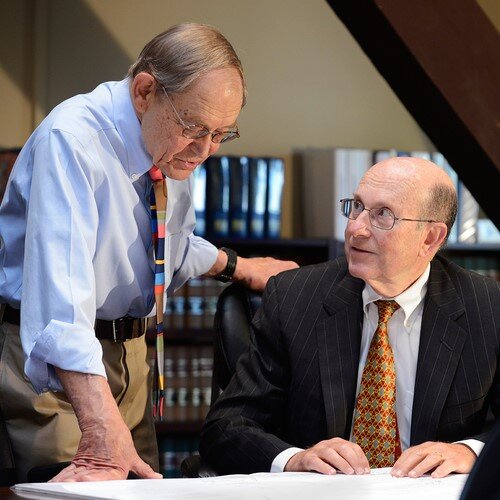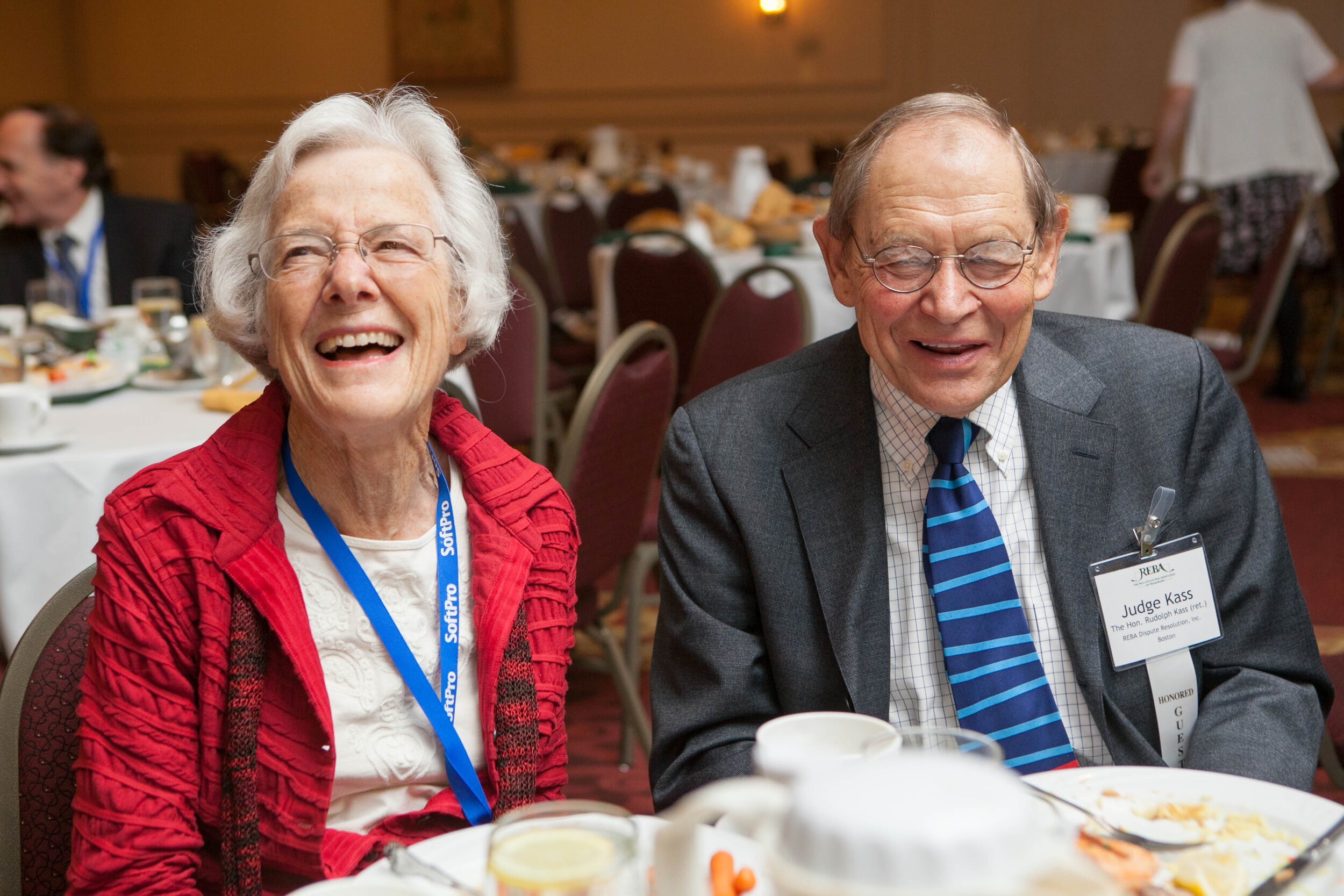In Remembrance of Rudolph "Rudy" Kass
It is with deep regret and profound sadness that we announce the passing of Rudy Kass. It goes without saying that he will be dearly missed by all. His passing leaves an irreplaceable void in our TMG family. You can view his obituaries here: Boston Globe and Dignity Memorial
Below is a collection of tributes and stories from TMG staff and friends:
“How does one even begin to express the great loss to us all that comes with the death of Rudy Kass? Rudy was truly one of the great ones, and it was a privilege and a joy to have had the opportunity to work with him over these past many years.
Rudy joined The Mediation Group upon his retirement (and then re-retirement after his recall service) from the Massachusetts Appeals Court in 2003. His formidable legal writing and judicial achievements are legend — matched only, perhaps, by his fearless dedication to urban bike riding, a practice he continued well into his eighties, and gave up only reluctantly.
One of the traits I most admired in Rudy was his boundless curiosity and appetite for learning new things. He approached every case: arbitrations, mediations and special master services, all with great enthusiasm. Whether legally complex or mundane, he became fully involved in the matters at hand. I remember one pre-mediation conference call in which he was absolutely thrilled to learn the details of the inner workings of a septic system – and the effect of drain cleaner on the microbes underlying its effective functioning. There were no topics unworthy of his inquisitiveness.
Another quality which made Rudy very special was his unusually egalitarian respect for others. He took great pleasure and pride in rubbing shoulders with – and being counted among — the shining intellectual lights with whom he crossed paths from his time at Harvard, while practicing Real Estate law at Brown Rudnick, on the Court and then later, in his retirement. But his capacity to recognize and admire the intelligence of others extended well beyond those acknowledged as the best and brightest, and included the clerks, secretaries, administrators (like me!) and many others whom he got to know over the years and with whom he maintained warm, long term relationships.
Rudy’s beloved wife of over 60 years, Helen, predeceased him in 2016. In addition to his daughters Liz and Sue, son Peter, and their children, Rudy leaves behind a legion of friends and admirers. He will be missed. (In deference to Rudy, who loathed the use of passive voice, I should rephrase that: we will miss him.)”
— Amy Gordon
“Rudy of course had a stellar legal career before he joined us at TMG in 2003. He had built a reputation as a wise appellate judge and a brilliant writer. He would be a natural as an arbitrator, deciding cases in a judge-like role, and soon had a loyal following of lawyers seeking him out for his command of the law, his integrity and his fairness. Many then also sought him out to serve as a mediator, a role Rudy quickly recognized as quite different and calling on additional sets of skills. Rudy jumped at the chance to solve legal problems from a different perch and impressively approached the role with remarkable humility. He did not sit back and rely only on his status and reputation but rather developed a successful approach built upon his knowledge, wit and enthusiasm.
Rudy could often solve a difficult mediation with his ability to uncork a particularly apt story. In one mediation, a party said that she could not move off her latest negotiation position, as it was a “matter of principle.” Rudy then related the tale of a young associate who approached the esteemed professor Austin Scott, author of the 10-volume work on Trusts. The young associate complained that his client’s commitment to principle was preventing the client from acting in his own best interest. Professor Scott’s response, said Rudy, was that “sometimes we must rise above principle.” Rudy’s mediation party got the point.
In our organization, Rudy was ever generous with his time and wisdom. I went to him early and often seeking advice on any puzzling real estate matter and quickly learned that his knowledge was encyclopedic over a vast array of legal subject matter. He would spend whatever time might be needed to educate me. I also came to understand that he was similarly unstinting in giving of himself to countless institutions, agencies and individuals around the Commonwealth. It took me a while to appreciate the breadth of that service because he did it so quietly and with no need to claim credit.
As all know, Rudy loved language, and he was a master in crafting it to be at once witty, concise and profound. He took delight in seeing the opinions he had written from the bench shape the everyday disputes that we saw in mediation. He and I had an arrangement: whenever one of his opinions came up in the course of a mediation of mine, I would ask Rudy whether he wanted to recall it by its facts, the law he helped decide, the literary allusion he had made or the sharp turn of phrase he had created. While he was enthusiastic about any of the four, I think he was happiest talking about the last. Those conversations would jump around to some of his favorite cases and we would often come back to one of his constructions that still tickled him. After the wolf at a public zoo bit the finger of a child standing outside the cage, the boy’s parents sued for negligence because the design of the cage allowed “the wolf, doing what carnivores will,” to poke his snout out and take a chunk out of the kid’s digit.
Rudy’s turns of phrase not only enlivened his opinions, but also shaped the law. One of his most famous shows up frequently in mediation conversations as it set the standard for measuring unfair or deceptive practices between businesses. A complaining party would have to show that the practice, wrote Rudy, “attained a level of rascality that would raise the eyebrow of one inured to the rough and tumble of the world of commerce.” His words captured something intuited by many, the standard was adopted and then quoted and cited in hundreds of court opinions. Some scholars and justices of the Massachusetts Supreme Judicial Court eventually criticized the standard as not being sufficiently descriptive of what conduct fit and what did not, at which Rudy quietly took umbrage. I offered some reassurance that the standard had considerable vitality in many a mediation dispute, but when we recently discovered that his test had jumped the border and word for word became the law of New Hampshire, he expressed just a bit of puckish delight.
In our office, in our lives and in the law, Rudy was, and is, a gentle force and a joy.”
— Brad Honoroff
“I visited Rudy a few times at Lasell Village. One conversation dealt with Rudy as a writer of judicial opinions. I mentioned an observation by JK Galbraith that his books usually went through about eight drafts, and in the eighth draft he inserted the spontaneity. Rudy ran with that. Rudy explained that he used wit only in furtherance of the point of his opinion, “never just to be cute.” He was aware of course that displays of wit were rare in court opinions so he felt an obligation to maintain a high standard of judicial thinking. “The idea wasn’t to be funny. The idea was to highlight the fact that we were dealing with real people, and to give that prominence. Being funny was just a bonus.” Since he got to be known as a judge willing to use wit in an opinion, he wanted to avoid any thought that he was frivolous as a judge. So he “worked extra hard to nail down my reasoning.””
— David Matz
“I always found Rudy an attentive, smart and wise listener. If he asked me how I was that day, he really wanted to know the full answer (and he knew how wordy I could be). He was present, there, — refreshingly unusual conduct for a human. I could always also count on him for two things consistently: humor, especially in his opinions; and a wisdom that I find rare. He was very very smart, but never lost sight of the human condition, common sense and a wise approach to life’s problems. I will miss him for these and so many other reasons... A mensch comes to mind as an apt description.”
— Isaac Borenstein
“To state that that Rudy Kass was an exceptional lawyer, jurist, mediator and human being is a gross understatement. Rudy was the antithesis of the ordinary and that was readily apparent to all those who had the good fortune of counting him as an acquaintance, friend or colleague. His trademark chuckle punctuated virtually any conversation and put people at ease, at the same time that he would be quoting often obscure passages (at least to me) from great literature.

Rudy was determined to and did excel at whatever he undertook. He not only excelled in his legal career as a real estate lawyer, judge and mediator, but he was a legendary craftsman of captivating judicial decisions, which will be his lasting legacy. He also made significant contributions to so many legal and community institutions.
For me, however, Rudy was most impressive for living his values of hard work, decency, generosity and concern for others. He was a real mensch in a very quiet and unobtrusive way. In stark contrast, Rudy’s public persona, which was fueled in large part by his celebrated opinions, was hardly inconspicuous. But his core and endearing humility never wavered. He was a role model for so many of us, even though the combination of his unique qualities and skills could not be duplicated.
Rudy made a real difference in his life and will be very much missed.”
— Joel Reck
“I will always think of Rudy Kass with affection and admiration.
I admired Rudy from afar long before I had the good fortune to work with him more closely. In fact, I sent Rudy a fan letter more than 40 years ago! Beyond his stature in the legal realm, he was also just a truly lovely person. Rudy and his wife Helen were always gracious when Jim and I ran into them at the Lexington movie theater. (Jim was as awe-struck as I with Rudy’s character). And, more recently, Rudy’s presence at TMG confirmed my belief that TMG was a great place to do mediation.
I can still experience that warm feeling that Rudy, and his memory, evokes: Rudy’s openhearted engagement warmed the spirit to its core.
I’m happy to have at hand a copy of Legal Chowder to dip into whenever I need a spoonful of Rudy’s unparalleled writing.”
— Elizabeth Butler
“E. B. White, the celebrated author of “Stuart Little” and “Charlotte’s Web” was born in 1899 and was thus about a generation older than our beloved colleague, Rudy Kass. Before his enormous success as an author of children’s literature (and I use that word advisedly) he was best known as a steady contributor of beautifully written short essays in The New Yorker. One of my most treasured books (one of the few I have that belonged to my parents) is a collection of those essays. Those of a certain age may remember a short and very useful book on writing, “The Elements of Style,” by Strunk and White, but may not know E. B White was that guy too. So, what does all of this have to do with Rudy Kass? Quite a lot actually, because one senses that if they had met, Rudy and E.B. White could have been great friends. I can envision a revised edition of “The Elements of Style” by Strunk, White and Kass. They shared not only a love of language, and the skill to implement that love, but also, it turns out, enormous affection for the state of Maine, and in particular a love of the Maine coast, which White often wrote about. One further connection, which I just discovered: they each had a son who was a boatbuilder. Of particular relevance to Rudy’s life, I think, is a favorite piece from the essay collection called “The Sea and the Wind that Blows.” Among other topics, it contemplates the author giving up sailing:
When does a man quit the sea? …This past winter I spent hours arguing the question with myself. Finally, deciding that I had come to the end of the road, I wrote a note to the boatyard, putting my boat up for sale. I said I was “coming off the water.” But as I typed the sentence, I doubted that I meant a word of it. If no buyer turns up, I know what will happen. I will instruct the yard to put her in again—“just till somebody comes along.” And then there will be the old uneasiness, the old uncertainty, as the mild southeast breeze ruffles the cove, a gentle, steady morning breeze, bringing the taint of the distant wet world, the smell that takes a man back to the very beginning of time, linking him to all that has gone before. There will lie the sloop, there will blow the wind, once more I will get underway…”There goes the old boy again,” they will say.
I don’t know if it was like that for Rudy to “come off the water,” but it surely encapsulates his stubborn refusal to get off the bike. And more important it reminds us of the unquenchable spirit of adventure that shone through his long and extraordinary life. A fitting epitaph for Rudy Kass comes straight out of “Charlotte’s Web.”
“It’s not often someone comes along who is a true friend and a good writer.” Like Charlotte, Rudy Kass was both.”
— Jeff Stern
“As a federal judge, I run into Chapter 93A regularly and I would say I have had occasion, therefore, to see or cite the Levings case about 100 times. The underlying proposition is often cited without attribution but not in my opinions. If more recent ideations are referred to, I always instruct my clerks to cite the original Appeals Court case and include the parenthetical “(Kass, J.)”. He was a poet as well as a terrific judge and will be sorely missed.”
— Honorable Nathaniel Gorton

